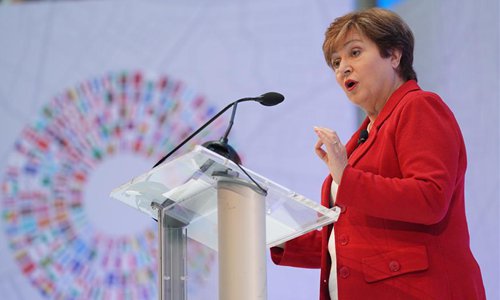HOME >> BUSINESS
IMF chief hails progress in China-US trade talks, urges "trade peace"
Source:Xinhua Published: 2019/10/18 14:49:12

Kristalina Georgieva, the new chief of the International Monetary Fund (IMF) delivers a speech in Washington D.C., the United States, on Oct. 8, 2019. Trade disputes are taking a toll on global economy, substantially weakening manufacturing activity and investment and holding back economic potential, Kristalina Georgieva said on Tuesday. (Xinhua/Liu Jie)
International Monetary Fund (IMF) Managing Director Kristalina Georgieva on Thursday hailed the progress made in the latest round of China-US trade talks as "extremely good news," urging the world to grasp the opportunity to achieve "a trade peace."
"I was encouraged by last week's announcements from the US and China," Georgieva said at the opening press conference of the IMF-World Bank Annual Meetings in Washington. "Our meetings this week are an opportunity for all parties to make progress in moving from a trade truce to a trade peace."
It was Georgieva's first press conference at the meetings after she took over the helm of the IMF on Oct. 1 from Christine Lagarde, who was nominated head of the European Central Bank.
"This is extremely good news that the US and China are talking to each other," the Bulgarian economist said when asked by Xinhua to comment on the trade negotiations between the world's top two economies. She added that the detente in China-US trade tensions is shrinking the negative impact on global growth, "and you would not be surprised."
Georgieva, however, cautioned that the latest improvement is not good enough. "What we need is to reach not just truce. We need to have trade peace," she said.
"We need to go forward to a system that is enhanced and it is enforced so we can see trade to return to its role of an engine of the world economy," she added.
Asked whether it requires that Washington and Beijing completely undo the tariffs and counter-tariffs so as to bring the global economy back on track, the IMF chief said she wouldn't "boil it down" to one single factor.
"But I would stress that it is highly beneficial to bring forward trade, and that means also to candidly assess what is not quite right in today's trade system," she said. "We all know that we have been reaching agreements on trade based primarily on the past, but you cannot drive just looking in the rearview mirror."
Posted in: ECONOMY